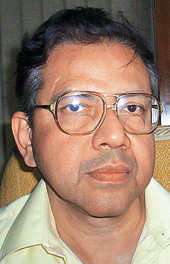 |
VIJAY SANCHETI, project director of SMSL-IRD (JV), the operator of the toll plaza on Vidyasagar Setu, met readers of The Telegraph at his office to answer their queries. Participants included Ramesh Khatri, Anil Pal, Subhash Das, Basudeb Chowdhury, Kalyan Ganguli, Vinod Jalan and Mohammad Sohrab
Kalyan Ganguli: What is the agreement between your company and the Hooghly River Bridge Commissioners (HRBC)? How was your company selected for operating the toll plaza?
The basic and most important part of the agreement is that my company will collect the toll from all vehicles according to the rate fixed by the HRBC. In return, we have to pay Rs 100 crore to the HRBC over five years.
The HRBC had invited bids from private companies for operating the toll plaza. We bagged the contract as we offered the highest amount of money. Now, our aim is to collect as much toll tax as possible so that we can recover our investment quickly.
Anil Pal: Will your company be able to register a profit after paying the government?
 |
| The new toll plaza at Vidyasagar Setu. A Telegraph picture |
We can make a profit if we can collect more than Rs 20 crore annually, which comes to over Rs 1.5 crore per month. Though we have not been able to collect that much toll so far, we hope to do so in the near future.
The number of vehicles crossing the bridge has dropped suddenly, which is a major cause of concern for us. We feel many drivers are not taking Vidyasagar Setu to avoid the dilapidated Kona Expressway. The commuters who used to take the Setu for reaching Howrah station or National Highway 6 are opting for Howrah bridge, even though it is a roundabout route.
Subhash Das: The toll collection shot up soon after you took charge of the plaza from the HRBC. What are the reasons?
I do not want to comment on what the HRBC had done. We have taken measures to ensure that each and every vehicle pays the toll. The system of collecting toll has been modernised by investing about Rs 5 crore. All the steps — from opening of gate to receipt of payment — have been computerised. As receiving of payment and opening of gate is interlinked, there is no scope of manipulation or malpractice by our employees. It is also nearly impossible for heavy vehicles to cross the bridge by paying the toll for cars.
Ramesh Khatri: Which vehicles are exempt from paying the toll?
According to our agreement with the HRBC, we allow 500 vehicles to cross the bridge daily without paying the toll. The transport department issues free passes to those vehicles. It is up to the department to decide who gets the free passes. We also do not collect toll from ambulances on humanitarian grounds. Moreover, we allow free passage to the army vehicles and private vehicles of army officers.
Vinod Jalan: Are you going to introduce smart cards to expedite the process of collecting toll? How does a smart card work?
The smart card can be bought from the toll plaza. Anyone can buy smart cards, which are valid for five years. Those with smart cards need not wait at the gate to pay the toll. They need to just produce the card in front of a machine for the gate to open automatically.
Mohammad Sohrab: Many VIPs, political leaders, police officers and bureaucrats refuse to pay the toll while crossing the bridge. How do you handle such situations?
We initially had to face such problems. Many drivers dropped names of VIPs, including police officers and political leaders, to skip paying the toll. Some unpleasant incidents also occurred. But after we brought the matter to the notice of the state government, the situation improved. We try to explain to the car-owners our policy of not letting vehicles pass without paying the toll. We are happy to say that now, almost everyone is willingly paying up. Even groups travelling in trucks for football matches or political rallies pay the toll.
Vinod Jalan: What steps have you taken to avoid long queues at the toll plaza?
We have opened all the eight lanes. One lane has been earmarked for two-wheelers and one for ambulances, police cars, fire tenders etc. As the system is computerised, payment of the toll does not take much time.
Kalyan Ganguli: Will you provide concessions to public buses?
Currently, even the state buses pay the toll to cross the Setu. If private bus or minibus-owners approach us for a concession, we will definitely consider their proposal.
Concluded
Hi-tech tags for smooth passage
Subhash Das: Do you have plans to develop the toll plaza further? If yes, how do you propose to modernise the system?
We have started work on an Electronic Toll Collection system. It will initially be introduced on one lane of the plaza. Under the system, which utilises Canadian technology, vehicles will neither have to stop at the plaza to pay the toll nor produce smart cards. To cross the gate unhindered, the vehicle-owners have to buy a smart tag, which is fitted with a computer chip, from us. The tag can be attached to any part of the vehicle. A machine attached to the gate will be activated by the tag when the vehicle approaches it. The gadget will open the gate automatically. A green signal will glow when a vehicle with a smart tag approaches the plaza. If there is any problem with the tag, the signal will be red.










